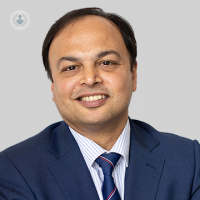PCOS: what causes polycystic ovaries?
Autore:Polycystic ovarian syndrome (PCOS) is a relatively common condition affecting a woman’s ovaries, which can lead to various symptoms, including difficulty conceiving a child. What causes PCOS and what effects can it have? Experienced gynaecologist Mr Parijat Bhattacharjee explains.

What causes polycystic ovary syndrome (PCOS)?
Polycystic ovarian syndrome is a misnomer. There are no true cysts (only sacs containing eggs that have not matured). Also, just finding polycystic ovaries on a scan does not mean that one has the condition.
PCOS has a genetic basis. Insulin is the hormone that controls our blood sugar. Those who are prone to developing type 2 diabetes, such as the Asian population or those with a family history, are more likely to develop PCOS. These patients have a resistance to the effect of insulin, making their bodies unable to control their blood sugar effectively. The body produces excess insulin in an attempt to overcome this. This extra insulin causes a whole range of hormonal changes in the body that lead to symptoms of PCOS.
Gaining weight increases the resistance to insulin and therefore can worsen these effects.
What are the symptoms?
Because of the hormonal changes, ovulation (maturation and release of eggs) does not take place every month. This can cause difficulty conceiving. If ovulation does not take place, periods are also delayed, sometimes for months.
There are additional hormonal effects leading to excess hair growth, skin changes or acne.
In the longer term, there is an increased risk of developing diabetes (type 2).
Can PCOS cause infertility?
PCOS is the most common cause of infertility, owing to eggs not being released in time. However, since there is no dearth of either eggs or hormones, it is more amenable to treatment than in conditions where there is a deficiency.
In most cases, however, weight loss is all that is needed to correct the hormonal imbalance and, consequently, ovulation.
Also, most women might ovulate in some cycles, and therefore, may get pregnant despite having PCOS.
What is the treatment for PCOS?
Treatment depends on the symptoms. If one is overweight, weight loss alone may reduce symptoms or help the patient to conceive, especially in conjunction with treatment e.g. IVF.
If fertility is the issue, simple medications like clomiphene with or without metformin (taken for five days every month) or minor key hole surgery (ovarian drilling) may be all that is required. In some cases, IVF (assisted reproduction) may be needed.
Excess hair growth can be treated with certain contraceptive pills (which oppose the effect of a relative increase of the male hormone, testosterone). Any pill is effective, but I would recommend Dianette or Yasmin. In resistant cases, there are other medications that can be given. Local treatment like epilation or waxing may be helpful.
Acne is treated with usual treatments including local creams or oral antibiotics.
Period abnormality, which is often spaced out and can be heavy and irregular can usually be controlled with hormonal contraceptive pills.
Can PCOS lead to cancer?
In every menstrual cycle, once eggs are released (usually around the middle of a regularly monthly cycle), the ‘pregnancy hormone’, progesterone is produced in addition to the oestrogen from the ovaries. Progesterone opposes the effects of oestrogen.
In PCOS, because of the lack of ovulation, progesterone is not produced. Therefore, oestrogen continues to thicken the lining of the womb, sometimes for months. This uncontrolled growth can occasionally lead to abnormality and cancer of the lining of the womb.
Therefore, it is essential to have at least one period every three months. If it does not happen spontaneously, your doctor may give you simple hormones for 5-7 days every three months to ‘induce’ a period.
If one is not trying to conceive, a hormone-controlling coil (Mirena) inserted inside the womb can prevent cancer.
Is there a cure for PCOS?
Because there is a genetic basis, there is no cure. However, the symptoms (including delayed fertility and period disturbances) can be controlled or kept at bay by keeping weight under control.


